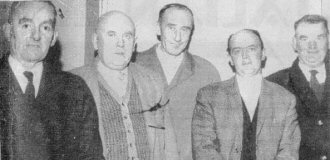Newry was still at the height of its commercial and industrial power towards the close of the nineteenth century when workers’ unionisation became an issue. The concentration of manufacturing in industrial cities had not yet stripped the smaller towns of such enterprises as brewing, distilling and baking. One of the bakery moguls, Willis of Monaghan Street in 1896 locked out his employees who were agitating for a fair wage and decent working conditions. There was no shortage of volunteer blackleg workers from out of town willing to fill their shoes. To the eternal shame of the present writer, it must be acknowledged that by this route did his grandfather first arrive in Newry about that time! Newry was one of the first Irish towns to have a Trades Council. In 1890 it had a membership of 280 and seven affiliated unions. In the same year branches of the National Union of Dock Labourers and the National Amalgamated Union of Labourers were set up here.
Further evidence of the reactionary attitude of employers came in 1904 when Wilson’s Mill Ltd. in Cecil Street locked out some 270 workers rather than negotiate a dispute over wages. But it was the docks that became the greatest centre for agitation since almost all goods passed through and the owners ruthlessly exploited the plight of dock workers desperate for even casual work to feed their families. The son of a local exile, James Larkin did most to organize the dock labourers first in his native Glasgow, but in quick succession the other major British ports and then Belfast, Dublin, Newry and the other Irish ports of entry. Newry Dock Labourers joined their Belfast comrades in the 1907 strike. John Gray of the Linenhall Library rightly points out that this action called for courage on their part where they were in defiance not of Protestant and British vested interests as in Belfast but Catholic businessmen and indeed Catholic Church representatives. The local leader was James Fearon, elsewhere extolled on Newry Journal. Bill McCambley asserts that ‘behind the back of Fearon and the Union, the Catholic Bishop Dr O’Neill and others cobbled together a draft agreement and presented it to the dockers who, because of its origin, signed it, despite the contrary advice of Fearon who indicated that it upheld the absolute right of the employers to hire whomever they wished and obliged men to discharge all boats unconditionally.
(Labour in Newry: 1 of series of 8)
